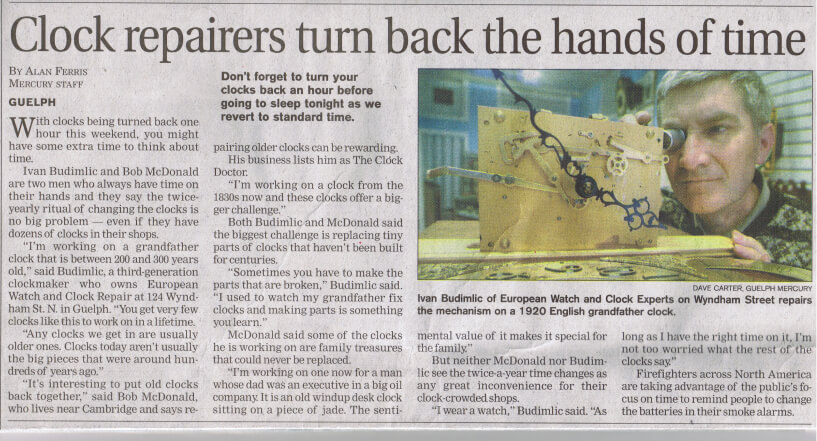
With clocks being turned back one hour this weekend, you might have some extra time to think about time.
Ivan Budimlic and Bob McDonald are two men who always have time on their hands and they say the twice-yearly ritual of changing clocks is no big problem – even if they have dozens of clocks in their shops.
“I’m working on a grandfather clock that is between 200 and 300 years old,” said Budimlic, a third-generation clockmaker who owns European Watch and Clock Repair at 124 Wyndham St. N. in Guelph. “You get very few clocks like this to work on in a lifetime.”
“Any clocks we get in are usually older ones. Clocks today aren’t usually the big pieces that were around hundreds of years ago.”
“It’s interesting to put old clocks back together,” said Bob McDonald, who lives near Cambridge and says repairing older clocks can be rewarding.
His business lists him as The Clock Doctor.
I’m working on a clock from the 1830s now and these clocks offer a bigger challenge.”
Both Budimlic and McDonald said the biggest challenge is replacing tiny parts of clocks that haven’t been built for centuries.
“Sometimes you have to make the parts that are broken,” Budimlic said. “I used to watch my grandfather fix clocks and making parts is something you learn.”
McDonald said some of the clocks he is working on are family treasures that could never be replaced.
“I’m working on one now for a man whose dad was an executive in a big oil company. It is an old windup desk clock sitting on a piece of jade. The sentimental value of it makes it special for the family.”
But neither McDonald nor Budimlic see the twice-a-year time changes as any great inconvenience for their clock-crowded shops.
“I wear a watch,” Budimlic said. “As long as I have the right time on it, I’m not too worried what the rest of the clocks say.”
Firefighters across North America are taking advantage of the public’s focus on time to remind people to change the batteries in their smoke alarms.
